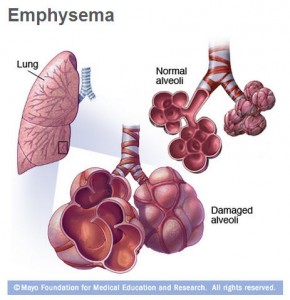-
Health & Wellness
Weekend Wellness: Thorough evaluation needed to determine if surgery an option for patient with emphysema
DEAR MAYO CLINIC: My father, 68, has advanced emphysema. Medication for it doesn’t seem to help as much as it used to. We’ve heard that volume reduction surgery is sometimes used in cases like his. What does this surgery involve? What are the benefits? How do we find out if he’s a good candidate for it?
ANSWER: Lung volume reduction surgery can help treat some severe cases of emphysema. The procedure involves removing part of the damaged lung tissue, so the remaining healthy tissue can work better. But it is only appropriate in a small number of cases. A thorough medical evaluation would be necessary to see if your father might be a good candidate for lung volume reduction surgery.
Emphysema is a form of chronic obstructive pulmonary disease, or COPD, that damages the lungs’ air sacs, called alveoli. The alveoli are clustered like bunches of grapes. In emphysema, the inner walls of the air sacs weaken and eventually break down. That creates one larger air space instead of many small ones. This decreases the surface area of the lungs and lowers the amount of oxygen that reaches the bloodstream.
Emphysema cannot be cured. Medications and pulmonary rehabilitation are the main therapies for this disease. Medications including bronchodilators, inhaled steroids, oxygen and antibiotics often are used to help ease breathing problems and prevent flare-ups.
A comprehensive pulmonary rehabilitation program is critical in the care of emphysema. Such a program can help people with emphysema live better by teaching breathing exercises and techniques that may reduce breathlessness and improve the ability to be active and exercise. When medications and pulmonary rehabilitation are not enough and quality of life is poor, surgery may be an option.
An extensive evaluation is required to determine if someone may be a good candidate for lung volume reduction surgery. That evaluation typically includes a comprehensive physical exam, exercise testing and a variety of other tests, such as tests of heart and lung function and a CT scan of the lungs to assess the severity and location of the emphysema.
For those who do undergo lung volume reduction surgery, a surgeon removes small wedges of the damaged lung tissue. It may be as much as 20 to 30 percent of each lung. In some cases, the surgery can be performed in a way that is minimally invasive and does not require a large incision.
Removing the diseased tissue allows the remaining tissue to expand further and work better. Research has shown that in people who are carefully chosen for it, lung volume reduction surgery can meaningfully improve exercise capacity, lung function and quality of life.
To be most successful in the long run, lung volume reduction surgery needs to be followed by lifestyle changes. For example, developing mindfulness by having a positive attitude and purpose in life despite the chronic illness, and learning ways to deal with difficult emotions, can be very useful in managing emphysema. Regular physical activity, such as walking for a half hour a day, may help ease symptoms. Continuing pulmonary rehabilitation is often part of follow-up care after surgery, too.
If your father is interested in exploring the possibility of lung volume reduction surgery, encourage him to ask his doctor about it or to make an appointment to see a lung specialist who is familiar with the procedure. Again, for a select group of people with advanced emphysema, the surgery can be a useful treatment option. I wish you well. — Roberto Benzo, M.D., Pulmonary and Critical Care Medicine, Mayo Clinic, Rochester, Minn.
Related Articles







